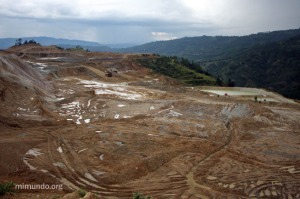
A crater and contaminated rubble — results of the Marlin Mine in Guatemala. Photo by James Rodríguez
A recent report presented to the Inter-American Commission on Human Rights (IACHR) explores the growing presence of Canadian mining companies in Latin America, highlighting a series of environmental and social concerns, and raising questions about who should ultimately be held responsible for violations related to Canadian-owned projects. The report, titled The Impact of Canadian Mining in Latin America and Canada’s responsibility [full report in Spanish], was written by a working group made up of six civil society organizations from Latin America and one from the US, with input from twenty-two additional Latin America-based organizations.
Open pit mining is well known to cause serious environmental damage, and the authors draw particular attention to the contamination of rivers and drinking water. The damning report also describes flagrant violations of the right to life, property, and health as well as activities that destabilize the social fabric of communities and alter traditional property and decision-making structures. Examples include repeated instances of irregular and fraudulent land acquisition, forced displacement of communities, criminalization of community resistance to mining projects, violence directed at locals who oppose mining projects, dangerous working conditions, and the failure of mining companies to participate in prior consultation or respect traditional decision making processes. The authors note that the inability to address concerns through judicial channels means that popular protest is frequently the only available tool communities have to draw attention to violations committed by mining companies.
These conclusions were drawn from a study of 22 cases across 9 Latin American countries, including the Marlin Mine in Guatemala — an open pit gold mine owned by a subsidiary of the Canadian company Goldcorp Inc. The Marlin Mine case reflects trends presented in the report, including a contaminated water supply, structural damage to houses from the use of explosives at the mine, and social protest that has been met with violent repression. The project has generated serious social and environmental fallout with relative impunity, and no prior consultation was carried out with indigenous communities who would be affected by the mine.
One important issue raised here is, simply, who should be held accountable for these violations. While the host countries and the companies themselves play important roles, the authors argue that parent companies’ home countries (in this case Canada) should take much more responsibility for crimes that are committed abroad.
Canadian companies are responsible for 50% to 70% of all mining in Latin America, and the role of the Canadian government in actively supporting these projects — through legal, political, and judicial channels — is problematic. While Canada is aware of the concerns plaguing the mining industry, it continues to work to strengthen the power and legal position of its companies through diplomatic and financial pressure. The authors strongly recommend that the Canadian government stop providing assistance to international mining companies with the intention of adopting regulatory frameworks in foreign host countries that favor investment in the mining sector at the expense of weakening protections for human rights.
Next Wednesday, May 28th, environmental activist Oscar Morales will speak about his community’s struggle against a Canadian-owned silver mine in San Rafael Las Flores, Guatemala. Oscar has been criminalized for resisting mining and demanding civil rights in his community; opponents of the mine have been shot by security guards, mysteriously killed and imprisoned for months on trumped up charges.
Please join us for the discussion: 6:30 – 8:30 pm at the Center for International Environmental Law (CIEL), 1350 Connecticut Ave. NW Suite #1100. Click here for more information.

Reblogged this on Justice and Solidarity.
Pingback: 50-70% of mining in Latin America is by Canadian companies, often with extensive environmental damage. Victims & human rights cases have had difficult gaining access to Canadian courts, til now | The Global Catholic Climate Movement